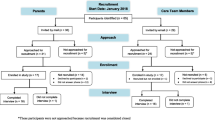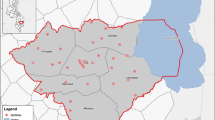Abstract
Background
Communication between caregivers and healthcare providers is important in the delivery of high-quality healthcare for children with medical complexity (CMC). Hispanic children face many challenges in access to healthcare services. Our objective was to describe the communication challenges faced by Spanish-speaking parents with limited English proficiency (SSP-LEP).
Methods
This was a qualitative study of 70 children of Spanish-speaking caregivers, enrolled in a complex care program of a tertiary care children’s hospital in North Carolina. Secondary source data were abstracted logs of care coordination tasks maintained by the program’s two bilingual care coordinators for a median observation period of 45 months, and complemented by data from care coordinator interviews. Data were entered and coded in ATLAS.ti. Using thematic content analysis and an iterative process, we identified recurrent themes related to communication challenges of Spanish-speaking caregivers.
Results
Median age of children was 5 years; 51% were girls; 97% had Medicaid; and 3% were uninsured. Seven children died during the observation period. Three major themes were identified as follows: (1) caregivers faced many communication challenges primarily because of language barrier. (2) Multiple factors at caregiver, provider, and system levels, in addition to language barrier, contributed to communication challenges. (3) Communication challenges had serious consequences for CMC. These consequences were lessened by bilingual coordinators.
Conclusion
SSP-LEP face unique communication challenges resulting in negative impact on the healthcare of their CMC. Bilingual coordinators can help improve communication between SSP-LEP and their healthcare providers. Interventions to address communication challenges of Spanish-speaking caregivers are warranted.
Similar content being viewed by others
Data Availability
The qualitative dataset generated and/or analyzed during the current study are not publicly available because of the potential for compromising privacy of individuals, but summarized data are available from the corresponding author on reasonable request.
Code Availability
Not applicable.
Abbreviations
- CMC:
-
Children with medical complexity
- EMR:
-
Electronic Medical Record
- SSP-LP:
-
Spanish-speaking parents/caregivers with limited English proficiency
- LEP:
-
Limited English proficiency
- WFHS:
-
Wake Forest Health Sciences
- BCH:
-
Brenner Children’s Hospital
- CSHCN:
-
Children with special healthcare needs
- PECP:
-
Pediatric Enhanced Care Program
References
Cohen E, Kuo DZ, Agrawal R, et al. Children with medical complexity: an emerging population for clinical and research initiatives. Pediatrics. 2011;127(3):529–38.
Kuo DZ, Goudie A, Cohen E, et al. Inequities in health care needs for children with medical complexity. Health Aff (Millwood). 2014;33(12):2190–8.
Feudtner C, Christakis DA, Zimmerman FJ, Muldoon JH, Neff JM, Koepsell TD. Characteristics of deaths occurring in children’s hospitals: implications for supportive care services. Pediatrics. 2002;109(5):887–93.
Cohen E, Berry JG, Camacho X, Anderson G, Wodchis W, Guttmann A. Patterns and costs of health care use of children with medical complexity. Pediatrics. 2012;130(6):e1463-1470.
Golden SL, Nageswaran S. Caregiver voices: coordinating care for children with complex chronic conditions. Clin Pediatr (Phila). 2012;51(8):723–9.
Kuo DZ, Cohen E, Agrawal R, Berry JG, Casey PH. A national profile of caregiver challenges among more medically complex children with special health care needs. Arch Pediatr Adolesc Med. 2011;165(11):1020–6.
Ngui EM, Flores G. Satisfaction with care and ease of using health care services among parents of children with special health care needs: the roles of race/ethnicity, insurance, language, and adequacy of family-centered care. Pediatrics. 2006;117(4):1184–96.
Ngui EM, Flores G. Unmet needs for specialty, dental, mental, and allied health care among children with special health care needs: are there racial/ethnic disparities? J Health Care Poor Underserved. 2007;18(4):931–49.
Flower KB, Skinner AC, Yin HS, et al. Satisfaction with communication in primary care for Spanish-speaking and English-speaking parents. Acad Pediatr. 2017;17(4):416–23.
Jaramillo J, Snyder E, Dunlap JL, Wright R, Mendoza F, Bruzoni M. The Hispanic Clinic for Pediatric Surgery: a model to improve parent-provider communication for Hispanic pediatric surgery patients. J Pediatr Surg. 2016;51(4):670–4.
Levas MN, Cowden JD, Dowd MD. Effects of the limited English proficiency of parents on hospital length of stay and home health care referral for their home health care-eligible children with infections. Arch Pediatr Adolesc Med. 2011;165(9):831–6.
Cohen AL, Rivara F, Marcuse EK, McPhillips H, Davis R. Are language barriers associated with serious medical events in hospitalized pediatric patients? Pediatrics. 2005;116(3):575–9.
Levas MN, Dayan PS, Mittal MK, et al. Effect of Hispanic ethnicity and language barriers on appendiceal perforation rates and imaging in children. J Pediatr. 2014;164(6):1286-1291 e1282.
Jimenez N, Jackson DL, Zhou C, Ayala NC, Ebel BE. Postoperative pain management in children, parental English proficiency, and access to interpretation. Hosp Pediatr. 2014;4(1):23–30.
Eneriz-Wiemer M, Sanders LM, Barr DA, Mendoza FS. Parental limited English proficiency and health outcomes for children with special health care needs: a systematic review. Acad Pediatr. 2014;14(2):128–36.
Yu SM, Singh GK. Household language use and health care access, unmet need, and family impact among CSHCN. Pediatrics. 2009;124(Suppl 4):S414-419.
Nageswaran S, Rosado AI, Beveridge MS Jr. Challenges faced by Latino caregivers in transportation of children with medical complexity. N C Med J. 2018;79(6):358–64.
O’Brien BC, Harris IB, Beckman TJ, Reed DA, Cook DA. Standards for reporting qualitative research: a synthesis of recommendations. Acad Med. 2014;89(9):1245–51.
Ravitch SM, Carl NM. Qualitative research: bridging the conceptual, theoretical, and methodological. 2nd ed. Los Angeles: Sage; 2021.
Green J, Thorogood N. Qualitative methods for health research.: Sage Publications; 2018.
Research Electronic Data Capture. Clinical & translational science awards. http://project-redcap.org/.
U.S. Census Bureau: QuickFacts. https://www.census.gov/quickfacts/. Accessed 7/12/2017.
The Rural Center: Rural county map. http://www.ncruralcenter.org/rural-county-ma. Accessed 7/12/2017.
ATLAS.ti. Qualitative data analysis [computer program]. Version 7.2. Berlin, Germany: Atlas.ti Scientific Software Development GmbH; 2013.
Highland KB, Lundahl A, Kidwell KM, Hankey M, Caballos M, McChargue D. Latina and non-Latina mothers’ perceived health barriers and benefits and their relationship to children’s health behaviors. Matern Child Health J. 2016;20(6):1305–13.
Gutman CK, Cousins L, Gritton J, et al. Professional interpreter use and discharge communication in the pediatric emergency department. Acad Pediatr. 2018;18(8):935–43.
Flores G. The impact of medical interpreter services on the quality of health care: a systematic review. Medical care research and review : MCRR. 2005;62(3):255–99.
Bradshaw M, Tomany-Korman S, Flores G. Language barriers to prescriptions for patients with limited English proficiency: a survey of pharmacies. 2007;120(2):e225-e235
Dew KN, Turner AM, Choi YK, Bosold A, Kirchhoff K. Development of machine translation technology for assisting health communication: a systematic review. J Biomed Inform. 2018;85:56–67.
Yu SM, Nyman RM, Kogan MD, Huang ZJ, Schwalberg RH. Parent’s language of interview and access to care for children with special health care needs. Ambul Pediatr. 2004;4(2):181–7.
Leyva M, Sharif I, Ozuah PO. Health literacy among Spanish-speaking Latino parents with limited English proficiency. Ambul Pediatr. 2005;5(1):56–9.
Gannotti ME, Kaplan LC, Handweker WP, Groce NE. Cultural influences on health care use: differences in perceived unmet needs and expectations of providers by Latino and Euro-American parents of children with special health care needs. 2004;25(3):156-165
Munoz-Blanco S, Raisanen JC, Donohue PK, Boss RD. Enhancing pediatric palliative care for Latino children and their families: a review of the literature and recommendations for research and practice in the United States. Children-Basel. 2018;5(1).
Flores G, Abreu M, Brown V, Tomany-Korman SC. How Medicaid and the State Children’s Health Insurance Program can do a better job of insuring uninsured children: the perspectives of parents of uninsured Latino children. Ambul Pediatr. 2005;5(6):332–40.
Flores G, Abreu M, Chaisson CE, et al. A randomized, controlled trial of the effectiveness of community-based case management in insuring uninsured Latino children. Pediatrics. 2005;116(6):1433–41.
Kuo DZ, McAllister JW, Rossignol L, Turchi RM, Stille CJ. Care coordination for children with medical complexity: whose care is it, anyway? Pediatrics. 2018;141(Suppl 3):S224–32.
Acknowledgements
We thank Ms. Aura Rosado and Ms. Vanessa Ortiz for participating in interviews about children with medical complexity, and Dr. Emily Ware MD, MSN for assistance with literature review.
Funding
Dr. Nageswaran was supported by Healthy Tomorrow’s Partnership for Children Program Grant from the Health Resources and Service Administration (H17MC11228) and Integrated Community Systems for CSHCN Grant from the Health Resources and Service Administration (D70MC23061).
Author information
Authors and Affiliations
Contributions
All authors have read and approved the manuscript.
SN conceptualized and designed the study, analyzed the data, interpreted the results, drafted the manuscript, approved the submitted version, and agreed to be personally accountable for the authors’ contributions and the accuracy or integrity of any part of the work.
MBE interpreted the results, conducted literature review, revised the manuscript, approved the submitted version, and agreed to be personally accountable for the authors’ contributions and the accuracy or integrity of any part of the work.
MSB collected data, analyzed data, interpreted the results, revised the manuscript, approved the submitted version, and agreed to be personally accountable for the authors’ contributions and the accuracy or integrity of any part of the work.
Corresponding author
Ethics declarations
Ethics Approval and Consent to Participate
The Wake Forest Health Sciences Institutional Review Board approved the study protocol. Written informed consent was waived. This manuscript reports aggregate data and does not report private information from any one individual.
Conflict of Interest
The authors declare no competing interests.
Additional information
Publisher's Note
Springer Nature remains neutral with regard to jurisdictional claims in published maps and institutional affiliations.
Margaret B. Ellis and Mark S. Beveridge affiliations changed from Wake Forest School of Medicine, Winston-Salem, NC, USA.
Supplementary Information
Below is the link to the electronic supplementary material.
Rights and permissions
About this article
Cite this article
Nageswaran, S., Ellis, M.B. & Beveridge, M.S. Communication Challenges Faced by Spanish-Speaking Caregivers of Children with Medical Complexity: a Qualitative Study. J. Racial and Ethnic Health Disparities 9, 2218–2226 (2022). https://doi.org/10.1007/s40615-021-01161-x
Received:
Revised:
Accepted:
Published:
Issue Date:
DOI: https://doi.org/10.1007/s40615-021-01161-x




